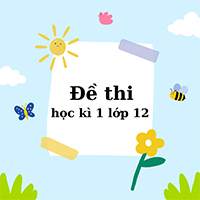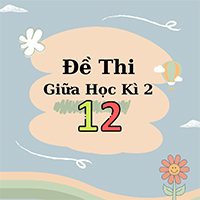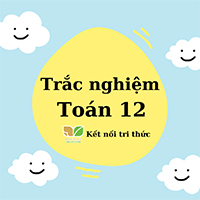Giải bài tập SGK Tiếng Anh lớp 12 Chương trình mới: Review 2 (Unit 4 - 5)
Giải bài tập SGK Tiếng Anh lớp 12 Chương trình mới: Review 2
VnDoc.com xin giới thiệu đến các bạn Giải bài tập SGK Tiếng Anh lớp 12 Chương trình mới: Review 2 (Unit 4 - 5) do VnDoc.com sưu tầm và đăng tải dưới đây là nguồn tài liệu hay và bổ ích giúp các bạn chuẩn bị tốt bài học, nâng cao hiệu quả học tập.
Giải bài tập SGK Tiếng Anh lớp 12 Chương trình mới Unit 6: Endangered species
Giải bài tập SGK Tiếng Anh lớp 12 Chương trình mới Unit 7: Artificial intelligence
Giải bài tập SGK Tiếng Anh lớp 12 Chương trình mới Unit 8: The world of work
Language (Ngôn ngữ) - trang 70 Review 2 (Units 4 - 5) SGK tiếng anh 12 mới
Tổng hợp các bài tập trong phần Language (Ngôn ngữ) - trang 70 Review 2 (Units 4 - 5) SGK tiếng anh 12 mới
LANGUAGE
Vocabulary
1. Use the correct form of the words or phrases in the box to complete the sentences. (Sử dụng các hình thức đúng của từ hoặc cụm từ trong hộp để hoàn thành câu.)
Đáp án:
1. blog
2. social networking
3. digital devices
4. mass media
5 .lnstant messaging
6. advent
2. Complete the sentences, using the correct form of the words in brackets. (Hoàn thành các câu, sử dụng hình thức đúng của từ trong ngoặc)
Đáp án:
1. assimilate 2. identity 3. National 4. ethnicity 5. integrate
3. Listen to the sentences and pay attention to the regular verbs in the past tense. Tick the correct box depending on the pronunciation of the verb ending -ed. Then practise saying them. (Nghe câu và chú ý đến các động từ thông thường ở thì quá khứ. Đánh dấu vào ô thích hợp tùy thuộc vào cách phát âm của động từ kết thúc -ed. Sau đó, thực hành nói chúng.)
Đáp án:
1. Yesterday I joined an interesting discussion about cultural identity.
2. She gained useful experience when working in a multicultural environment.
3. The teacher demanded that the student leave the classroom.
4. I watched a very interesting programme on TV last night.
5. IBM invented the first smartphone in 1992.
6. The small boy coughed a lot two days ago.
7. He hated Sundays when he was a child.
8. I looked for the latest model of tablets in the electronic store this morning.
9. My smartphone operated very well until it was hacked.
10. Lan studied very hard last year.
11. The little boy washed his hands carefully before the meals.
12. I believed in my ability to complete all the challenges.
Key /t/: 4, 6, 8, 11
/d/: 1, 2, 10, 12
/id/: 3, 5, 7, 9
Grammar
4. Fill each gap with an appropriate preposition. (Điền vào mỗi chỗ trống một giới từ thích hợp)
Đáp án:
1. to 2. of 3. in 4. for 5. from
5. Put the words in brackets in the correct tenses. (Đặt các từ trong ngoặc ở các thì đúng)
Đáp án:
1. Have... cleaned
2. haven't swept
3. have washed
4. have tried
5. has been studying
6. Match the two halves of the sentences. (Khớp hai nửa của câu với nhau)
Đáp án:
1. f 2. e 3.g 4. a 5. d 6. b 7 .c
Skills (Kỹ năng) - trang 72 Review 2 (Units 4 - 5) SGK tiếng anh 12 mới
Tổng hợp các bài tập trong phần Skills (Kỹ năng) - trang 72 Review 2 (Units 4 - 5) SGK tiếng anh 12 mới
SKILLS
READING
1. Read the text about advertising and the media.
Đọc bài viết về quảng cáo và truyền thông.
Advertising and the mass media
Having the power to deliver information to large audiences at the same time, the mass media have naturally become ideal tools for advertising. This huge industry has reached and dominated almost all types of the mass media. Advertisements are everywhere, from broadcast media (the radio, television and films), Internet media (email, websites and blogs), print media (newspapers, magazines, books and comics), outdoor media (billboards, signs and placards) to digital media, which include Internet and mobile devices.
Advertising is beneficial to the mass media too. Companies and businesses are willing to spend millions, even billions of dollars, to influence customers' attitudes towards their ideas, services and products. Their advanced advertising methods and techniques are successful in persuading customers of all ages and genders, and turning luxuries into necessities. Because of the easy access to all forms of the media, information can reach every corner of the world instantly and cost-effectively. In addition, all media channels m. receive huge sums of money from advertisers, which allows them to make better and more interesting programmes and services for a large number of people worldwide.
2. Read the text again and answer the questions.
1. Why have the mass media naturally become ideal tools for advertising?
2. What are some kinds of advertisements?
3. Why are companies and businesses willing to spend money on advertising?
4. How do advertisers persuade customers?
5. What does the easy access to the media offer advertising?
6. How beneficial is advertising to the mass media?
Hướng dẫn:
Đọc bài lại lần nữa và trả lời các câu hỏi
1. Because they have the power to deliver information to large audiences at the same time.
2. They are broadcast media, Internet media, print media, outdoor media and digital media.
3. They want to influence customers'attitudes towards their ideas, services and products.
4. They use (all forms of media and) advanced advertising methods and techniques.
5. Information can reach every corner of the world instantly and cost-effectively.
6. Huge sums of money from advertisers allow media channels to make better and more interesting programmes and services for a large number of people worldwide.
3. Work with a partner. Choose one idea (or use your own ideas) and make a conversation about social networking in schools.
Làm việc cùng một người bạn. Chọn một ý tưởng (hoặc sử dụng những ý tưởng của riêng bạn) và thực hiện một cuộc trò chuyện về mạng xã hội trong trường học.
4. Listen to a talk about how to maintain cultural identity abroad. Decide whether the following statements are true (T), false (F), or not given (NG). (Nghe một cuộc nói chuyện về làm thế nào để duy trì bản sắc văn hóa nước ngoài. Quyết định xem các nhận định sau đây là đúng (T), sai (F), hoặc không xác định (NG).)
1. Keeping in touch with your family and friends can help you to feel part of your native culture.
2. It is not necessary that your children talk to their cousins, aunts, and uncles.
3. The taste and smell of your favourite dishes from your home country can bring back good memories from your childhood or the past.
4. You should involve your kids and friends in shopping for traditional food, cooking and sharing recipes.
5. It is a good idea for you to celebrate your home country's holidays abroad too.
Đáp án:
1. T 2. F 3. T 4. F 5. NG
Audio script
Now, I'd like to give you some advice on how to maintain your cultural identity in a new culture.
Well, first of all, I recommend that you keep in touch with people you know back home. Staying connected with your far . and friends helps you to feel part of your native culture. If you have children, you should let them talk regularly to their cousins, aunts, uncles, and grandparents too. Today, modern technology like the Internet and instant messaging has made long-distance communication faster and more convenient than ever before.
Secondly, it's a good idea that you try to cook traditional food frequently. The taste and smell of your favourite dishes from your home country can bring back good memories from your childhood or the past. You should also remember to make mealtimes special and important occasions. If you're a parent, you can involve your children in cooking. They may find the cuisine of your country of origin fascinating. Shopping for traditional food, cooking and sharing recipes can also help to connect the different generations.
5. Write an essay of 180-250 words about maintaining cultural identity in the globalised world. Use the suggestions in the box or your own information and ideas.
Viết một bài luận trong 180-250 từ về việc duy trì bản sắc văn hóa trong thế giới toàn cầu hóa. Sử dụng những gợi ý trong hộp hoặc các thông tin và ý tưởng của riêng bạn.
Bài viết gợi ý:
There is no doubt that the world today has become one global village. Differences between cultures are becoming less evident. People worldwide watch the same TV channels and films, listen to the same music, eat the same food and follow the same fashion trends. That is why, in a globalised world, it is essential that people maintain their cultural identity.
The development of a strong cultural identity is essential to people's sense of belonging. It helps to define an ethnic group or community that shares unique and distinctive features. Cultural identity is also important as it connects people, reminds them of their shared history and strengthens the solidarity between them. The power of cultural identity can encourage and motivate people to unite against a common danger. A strong sense of cultural identity can also nurture their love and respect for their country, community and heritage.
However, in a globalised world cultural diversity is gradually disappearing. In an environment where everyone speaks only English and wears almost the same clothes, an individual's cultural identity is at risk of dying out. Maintaining cultural identity is vital for preserving the different languages, festivals, types of traditional music, dance and food, beliefs and other activities that make the world a fascinating place to live.
Globalisation is inevitable; however, it is essential for people to maintain their cultural identity. Preserving cultural identity can guarantee the prosperity of a country or community, and the world's cultural diversity.









